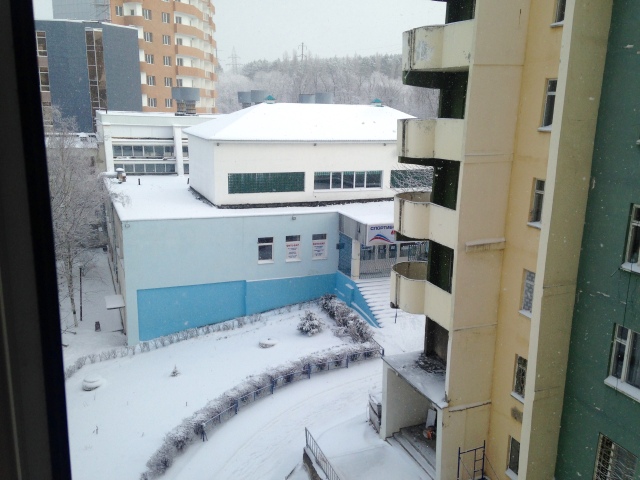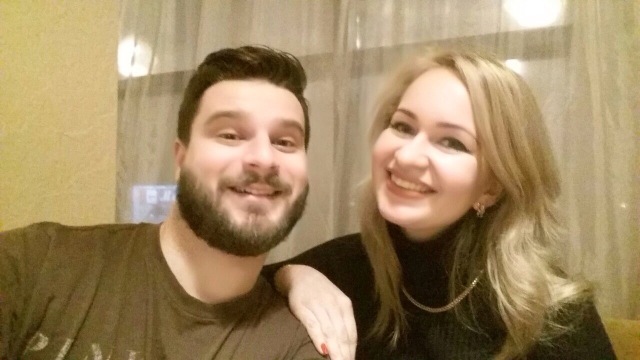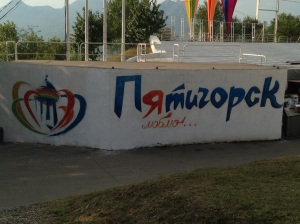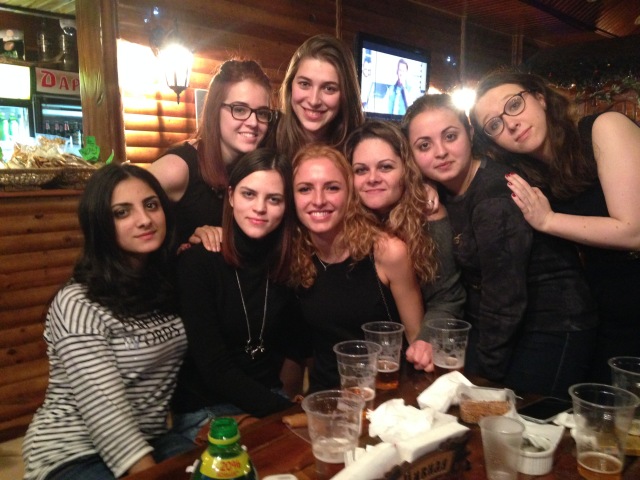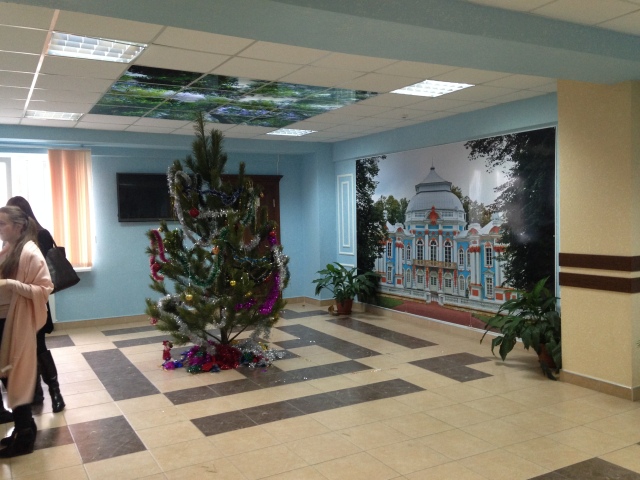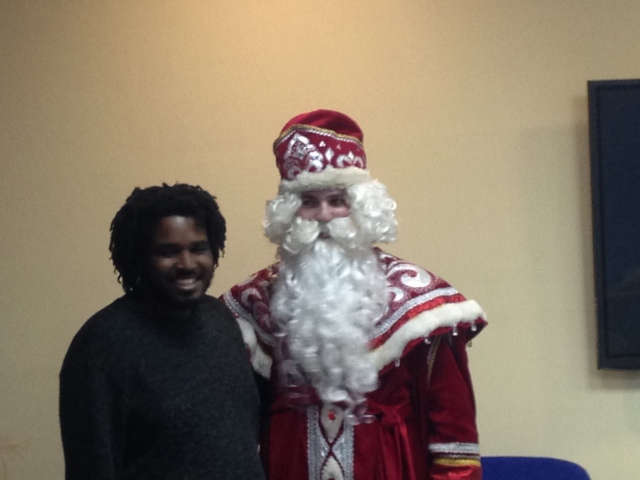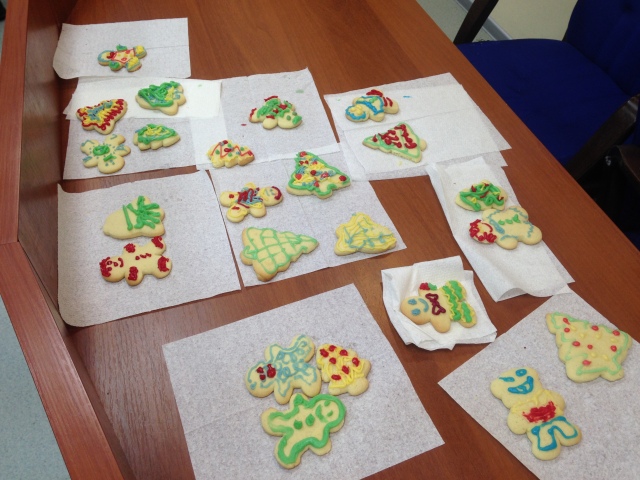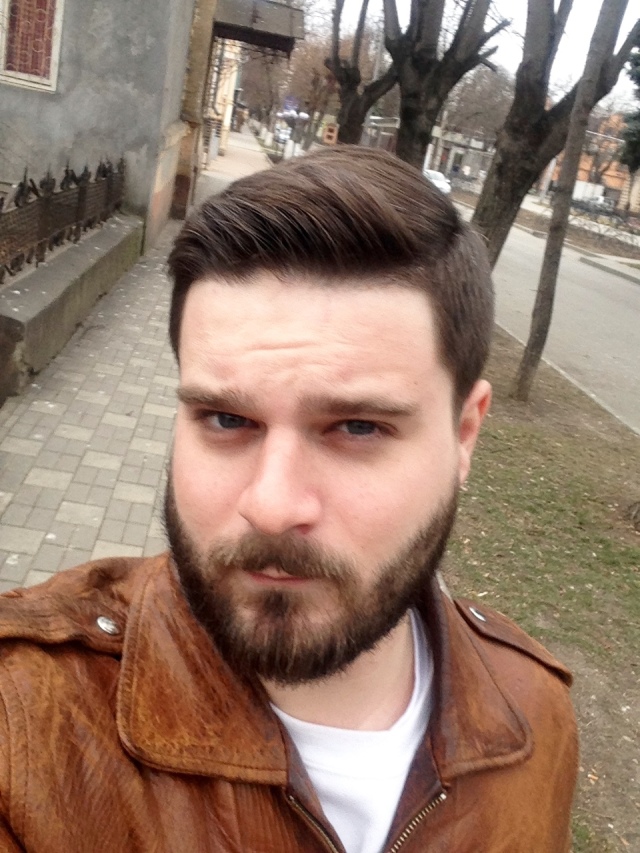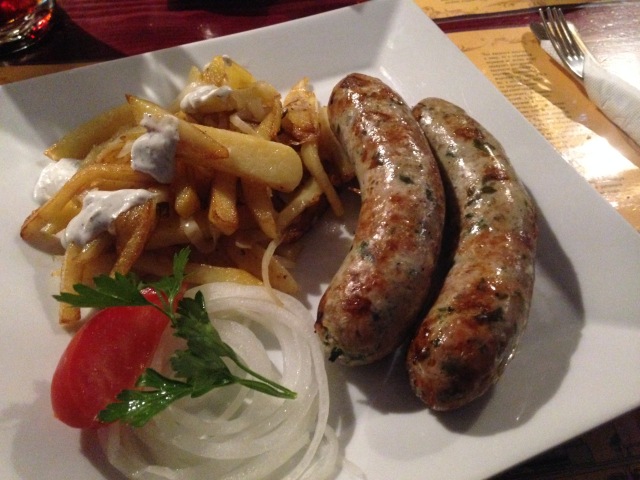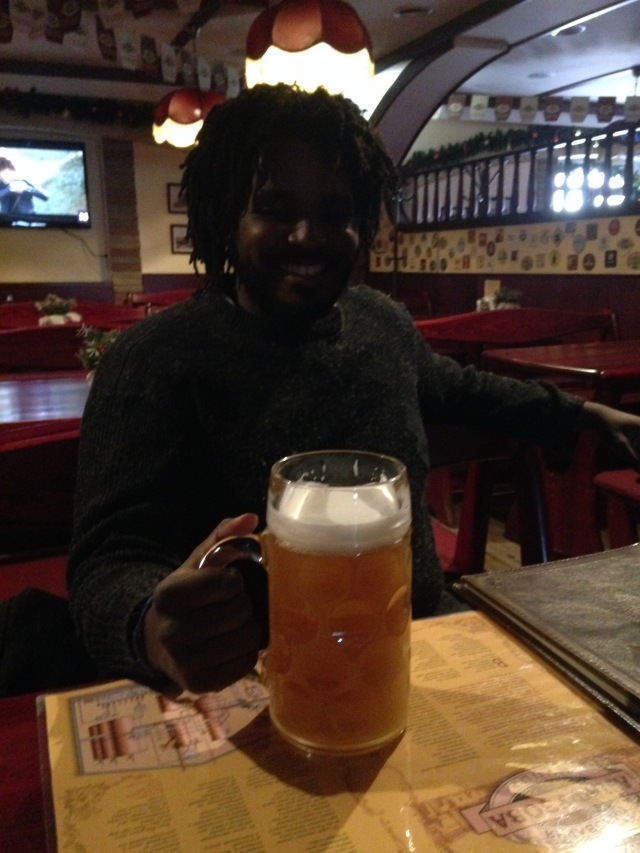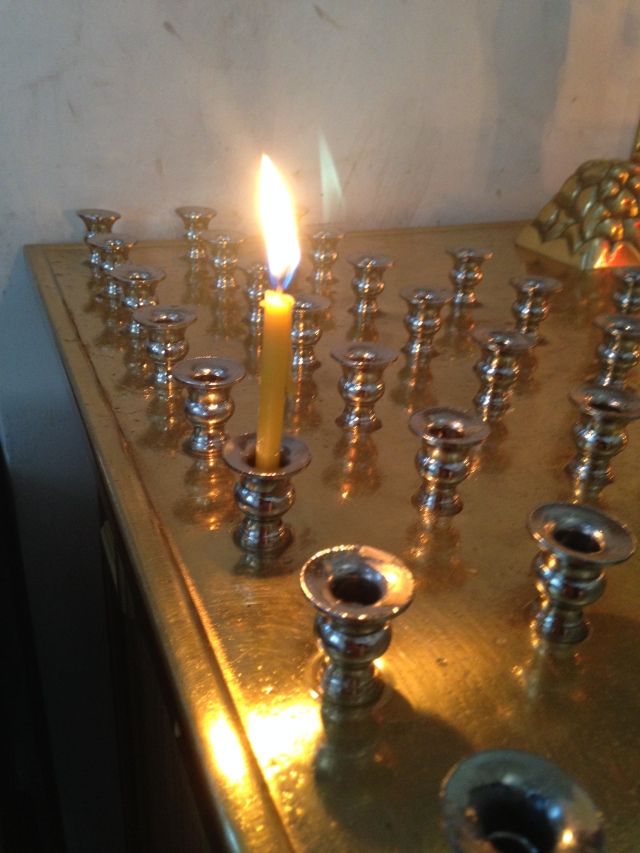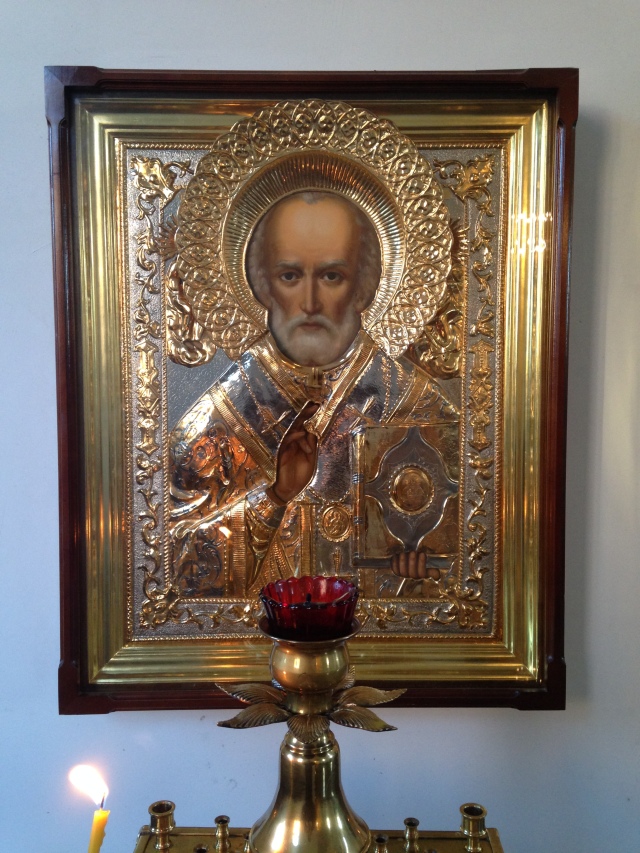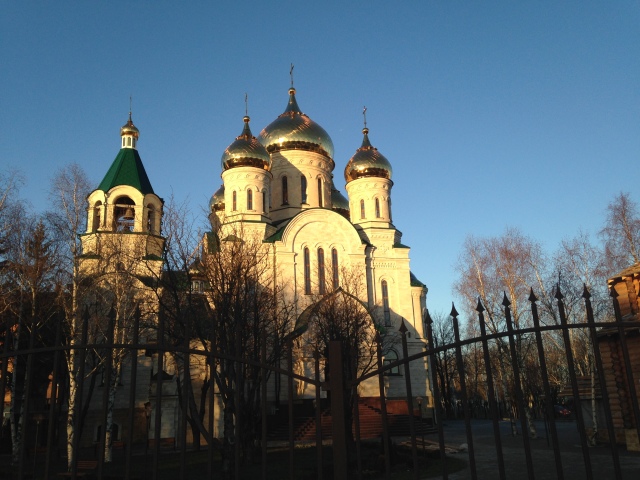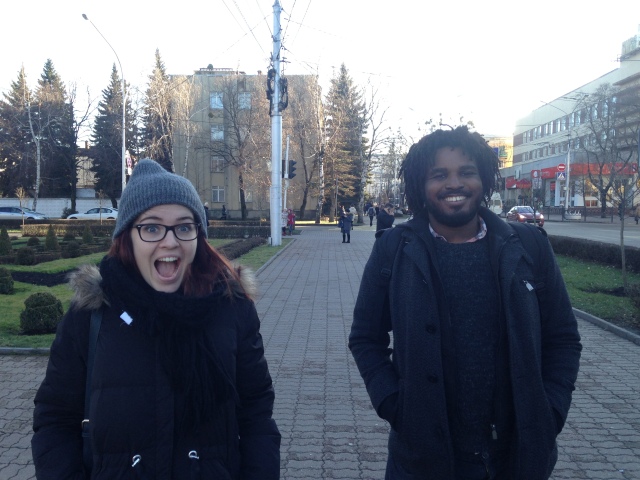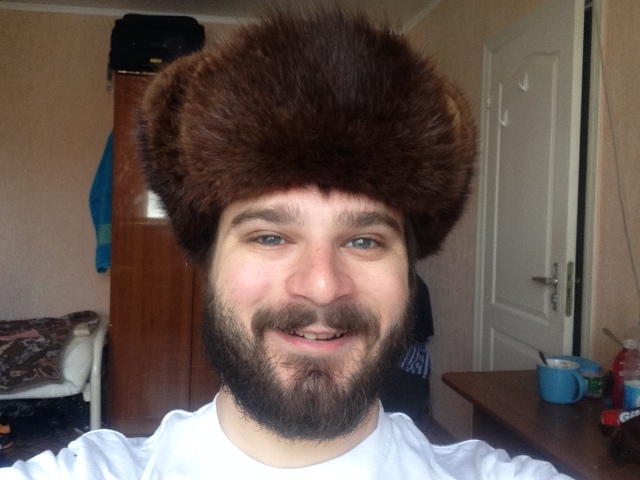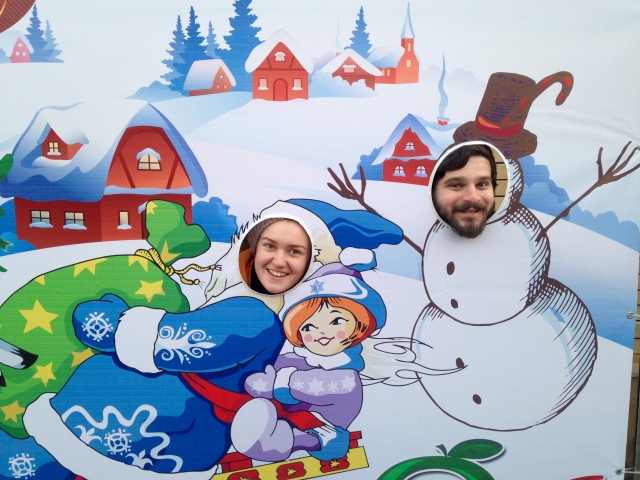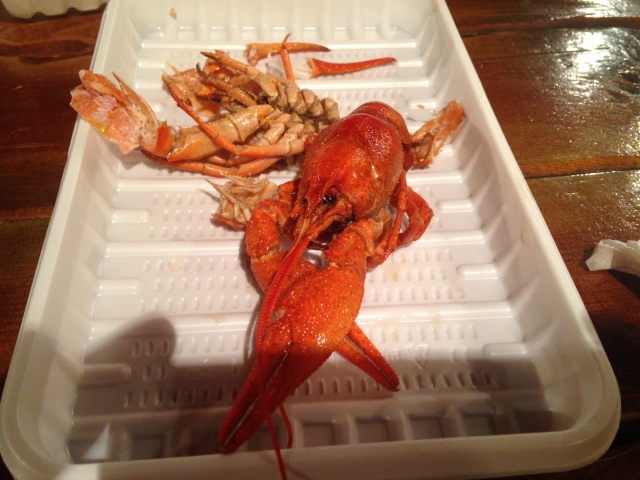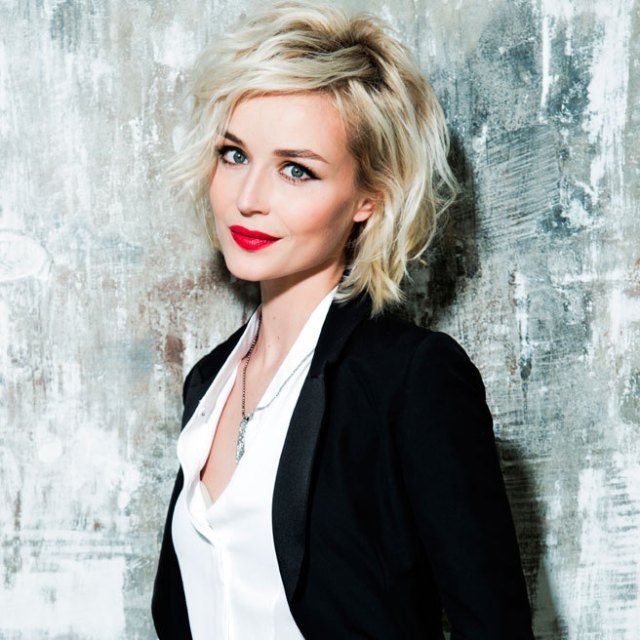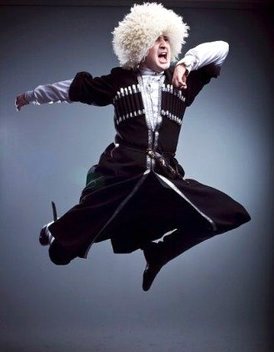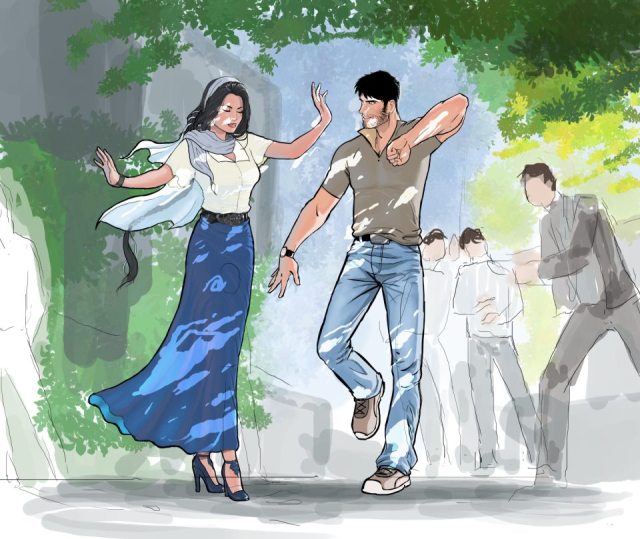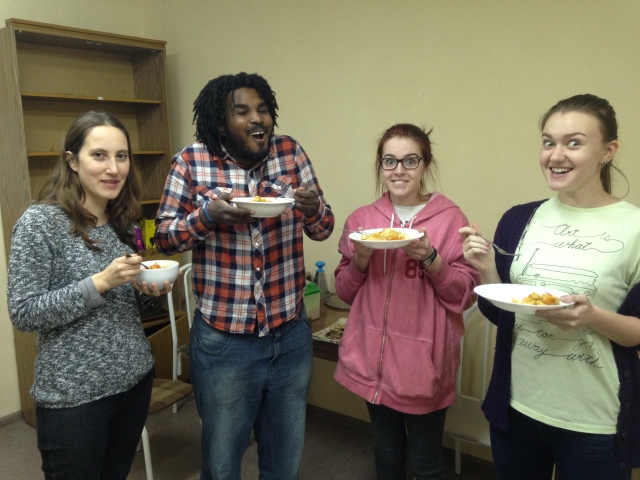Well, I feel very accomplished. On Monday evening I had some time on my hands and I decided to start teaching myself “Georgian 101.” I’ve started with the Georgian alphabet, learning it phonetically. So, in essence, I’ve taken a letter, for example the letter “ლ” and learned its sound and English equivalent, this case “la.” I have then written my name out in Georgian, “იან ალექსანდრე თათლ,” Ian Alexander Tuttle. I’m hoping to take course in another Caucasian language next semester, so I’m keeping my finger crossed as it were.
Thanksgiving Day was a downer at first, but as the day progressed it got better. I feel I miss home more this time around then during the first trip here. I guess it is because going overseas the first time on my own meant saying goodbye to the people and things I love for a year. My family and friends, plus the wonderful foods we have in the States (and more importantly, the rights and responsibilities we have as American citizens). Nothing can replace American BBQ, or my father’s pizza. I miss laughing with Taylor and holding her hand on walks though Heartwell Park in Hastings. I miss talking to my mother in person about my day (thank you Skype technology) and keeping her company during day. I miss going shooting with my father and sharing a beer at “Lucky Bucket” with him after a long day at work. I miss our symbols, American flags waving in the Nebraska wind. I miss the rounding hills of Bellevue and Papillion where I spent the majority of my childhood. Don’t get me wrong, I’m very happy to be here in the Caucasus again, and in a way it is a second home, but I only want to visit for a while. Home is more then “where the heart is,” it is a place of shared identity, culture and history that shapes who we are. Missing Thanksgiving hit me very hard this year.
Thanksgiving is uniquely a North American holiday (as the Canadians celebrate it to and I’d never want to leave out our cuisines from the North) and not being there to celebrate with family is difficult. When your in another nation, who doesn’t share your traditions, it becomes even more difficult. In cases such as this, I’ve tried to make up for the lost time and celebration by celebrating traditions and holidays that are part of the culture here. This helps in that you’ll learn more about the culture you are living with, meet new people, and it helps get your mind off of the things you miss at home. Joy can be found in all things as long as you have the right attitude toward the situation. So, I tried to go about my day as best as I could, wondering how my mother was doing with the baking and cooking of our families traditional dishes on Thanksgiving. I thought about how my poor father and millions of other Americans who had to work that day. I thought about the ice storm that was sweeping over the Mid-West. I thought about how Taylor was getting on while celebrating at Nik’s house, wishing I could be there with her and worrying the whole day whether she and Nik were safe driving to Kansas with the weather the way it was. I could envision the golden brown turkey sitting there on our dinner room table. The French silk, pumpkin-pecan pies, and jam tarts smiling back at me, waiting to be eaten, crying out “eat me, eat me.” I especially missed having my mother’s stuffing recipe, with the water chestnuts, sage sausage and other flavorful ingredients. And of course, cranberry sauce and cranberry orange relish.
The atmosphere was off, the feeling of Thanksgiving wasn’t in the air. I’d never thought I’d say it, but I missed football, as it was a part of the holiday, watching my father shake his head every time Ohio State would make a goal against Michigan State. A huge shame indeed. It was lonely as well, as most of my peers were traveling that week for a teaching/international students forum in the city of Kazan and a French language get together in the city of Volgograd (two cities I’d love to see sometime, but alas, fate wasn’t kind this time around). It was just Sarah and I in class for most of last week, but we had fun all the same. Classes were very slow last week to, because one of our professors was ill and another had a conference so, we had little work to occupy our time. Thankfully, I can always count on Alina or Vika if I’m sad or down. Vika was my Thanksgiving Day hero (I’ll explain later). We had English Club that day and talking about the foods, traditions and the like was difficult without feeling a little sad. I was asked to talk about the history behind the holiday. So, I discussed about the Brownist Descanters leaving England in 1620 for religious freedom and better economic opportunity and how they landed on Plymouth Rock in 1621, half of them dying of hunger and exposer in the first nine months of their stay in the New World.
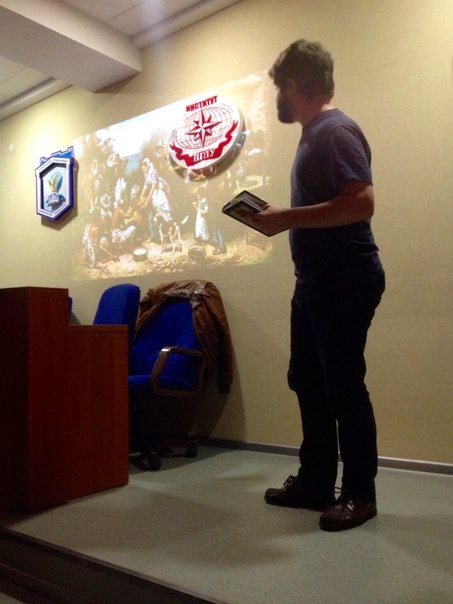
A depressing story to start out with, but as is our custom in America, we end on positive notes. The students were interested in the exchange of skills and food between the local Wampanoag tribe and the Puritan settlers. I citied a few documents from the Plymouth Historical Society, concerning the recordings of the “First Thanksgiving” the foods that were eaten and I was surprised to see a journal entree from my ancestor, Mary Brewster who was one of the four women who cooked on that historic day. This discovery made me even more nostalgic for Thanksgiving as I was preparing for that nights lesson. I remembered that she and her husband William Brewster were on the Mayflower, but I had no idea that she was one of the original cooks who helped prepare the cod, bass, duck, turkey and bread that were eaten on Thanksgiving. The Wampanoag also brought fish, along with version and “Indian” corn. The students loved to hear from all of us about our families traditions and foods. They were surprised at the diversity of traditions and customs among the four of us (Kirstie, Andrew, Martin and myself). We also got together and played a few games. One was from Kirstie’s family. You put three corn kernels into a cup and go around in a circle, one by one, saying what you are thankful for. I loved this in as it was so moving and great to heard what the students in my group were thankful for and I was relieved to have the opportunity to share what I was thankful for with them. A great cultural exchange. We then also played “Pin the Wattle on the turkey,” which was hilarious. We had a painting of a turkey, tapped to the wall, blindfolded the students and had them pin the red turkey wattle as best they could. We all had a blast.
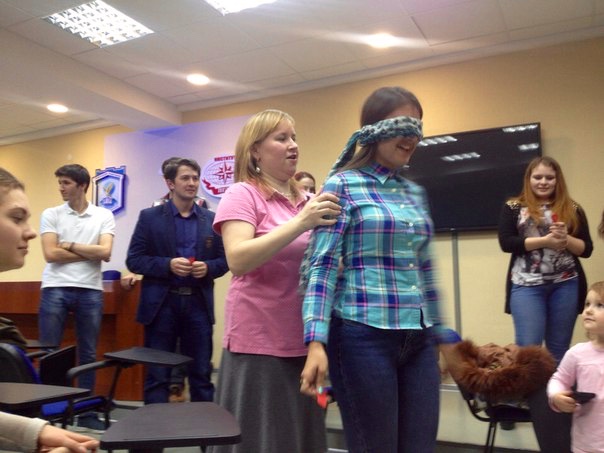
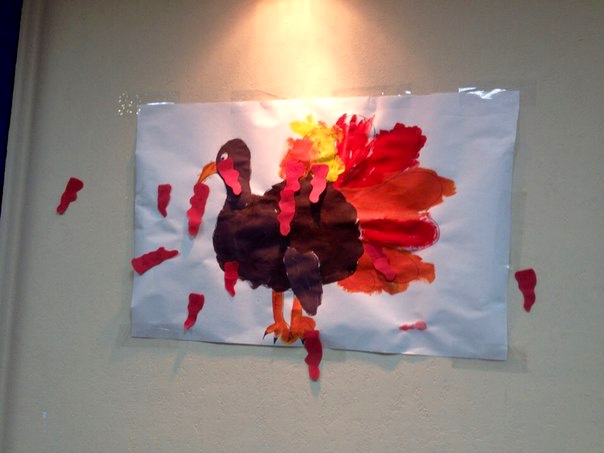
The best moment was when we had finished, English Club. I was walking back to the obshaga alone in the cold and dark when I saw Vika. She come up to me, gave me a great, big hug and said, “Happy Thanksgiving.” “Oh my dear Ianchik (my Russian nickname),” she said. “I’m so thankful for your friendship, for meeting you and for the new adventures we’re having.” I was stunned and it was a heart warming moment for me, something so unexpected. She then told me that she wouldn’t let me celebrate alone and told me to pick and restaurant and we’d go as soon as her homework for that evening was finished. So, in around a half and hour, Vika called me and we started walking to “Kinza.” I had also invited Martin to join us so he would be lonely on Thanksgiving too and we also ran into Diogo (he had just retuned for Kazan) on the way to the restaurant. The timing was perfect. We headed inside and sat down. “Kinza” wasn’t very busy that evening (after all, it was a Thursday) and we managed to get our food very quickly. We had a “Caucasian Thanksgiving” that night, as “Kinza” specializes in Caucasian cuisine from both the North and South Caucasus. I decided to have some of my favorite foods when we were there, some Georgian Khinkali to start out with. So, there’s a funny story behind this. When speaking in Russian at a normal pace, I have a bad habit of pronouncing my “kha” was just a “ka” and in Russian the word “kinkali” is sang for shit. So, in essence, I asked the waiter for “kinkali” as opposed to “khinkali” so, that was a little embarrassing. She looked at me like I was from Mars and laughed a little. Other then that little mess up, the evening was very enjoyable. I also ordered a khachapuri and I helped Martin finish off his manti. He ordered so much food, but I’m glad he’s found Russian/Caucasian food that he likes. After two months, my goal for finding him a traditional Caucasian food to like is now complete, success at last.
Last Friday was very interesting. After my classes that day, I was asked by Alina to guest teach in her grammar class and talk about resumés and applications for collage and work. I came to her class with a few examples of my own resumé and of job applications, as well as the documents for the various grants I received from Hastings. I explained the importance of the applications process, going step by step, informing the students of the differing formats in regards too business and university paperwork. I also emphasized that when writing an application one needs to “sell them self” to the institution they are applying to, saying why they are the better choice over the next person. I think that for them, it is a good opportunity to learn how this process goes and to practice for it, so they have experience writing a resumé and application. The students were very happy to have me there for being real life examples to class and so was their teacher. I maybe joining Alina’s group every now and again when needed to help them through this process and give them some life experiences. I will also start teaching a class of 4th year students in conversational English every Friday so, I’m looking forward to teaching again on a full schedule. As I was finishing up my class, I received several calls from Hesham and Diogo. I called Hesham back and this was the fellowing conversation.
Me- “Ello (Hello in Russian, when talking on the phone).”
Hesham- “Where are you?”
Me- “I’ve just finished teaching a class. I’m sorry for not answering the phone.”
Hesham- “That’s ok. Do you want to come to Nalchik?”
Me- “Nalchik? When are we leaving?”
Hesham- “We’re leaving now, we’re waiting for you.”
Me- “Oh, ok? When will we return?”
Hesham- “We will go for dinner and return this evening. We will meet some of my friends there.”
Me- “Ok, I’m game. Where should I meet you?”
Hesham- “We’re in the taxi now.”
This is likely the most spontaneous thing I have ever done in my life. For those of you who know me very well, you’re probably thinking, Ian did this and he wasn’t freaking out? Really? Yes, yes, I love to have a plan, but it was Friday, so I figured, what the hell. Hesham was very glad that I agreed to come. He complimented me for “always being ready to go somewhere.” I will say that regardless of how well a trip is planned, I’m up to travel. Hesham, Diogo and I take the taxi to Nalchik. The drive was much faster as we didn’t have to stop like if we were on a bus, making the ride more pleasant. We arrived in Nalchik at around 5:30 and stopped at an Arabic cafe. As we exited the cab, we were greeting by the smiling faces of Hesham’s friends and peers. I shook their hands, exchanging the greetings of “As salamu alaykum” and “Wa alaikum salam.” The cafe was small, but had a very home-like atmosphere. For those of you who have been at those family owned places in the States, that’s somewhat of the feeling I had with walking side. We all sat down. The menu was a long list of Arabic and Caucasian fast foods. Nalchik has a large Arab population, a there are many cafes that give a “taste of home” for these people. When asking what a food item was on the menu (I forget what it was I wanted to ask for), Hesham turned to me and said, “I’ve already ordered for you and Diogo.” I was a little confused, but just went with it, as I figured that it would be hard to find something that I didn’t what. I mean it’s a mix of Arabic and Caucasian foods, what’s not of like? We started out by having a foot-long falafel warp, which was one of the best falafel warps that I’ve had. It was very tasty. We also had shawarma and a rice pudding that was great. We all talked as best we could for the rest of the evening. Diogo and I were are a disadvantage as we were outnumbered six to two and could only communicate in Russian. Hesham’s friends study at the medical faculty at the University of Nalchik, so they took six months of Russian language and dropped themselves here, learning the rest on the fly. I was very impressed. We had some communication issues as it was difficult to understand some words in Russian as I don’t speak to many Arabic speakers who speak Russian, the ascents are difficult and harder to make out. It was a good cultural experience and I’m very glad that Hesham had invited me to come with him. I would comment that there was, or at least that I sensed some tense moments during the evening. The majority of the people there were Egyptian, but there as also a Syrian and a Palestinian there. One of the guys was repeating seven or eight times that this Palestinian guy was a “real Palestinian, and that he just had an Israeli passport.” Yes, I understand that he is Palestinian and has an Israeli passport, it was clear the first time. I was also asked what I thought about the Palestinian/Israeli Conflict. As opposed to saying what I thought (to be clear, I’m a supporter of Israel), I was very diplomatic and simply said it was “their (Palestinian and Israeli) problem.” The excitement quickly drained from their faces and I could tell that wasn’t the answer that were banking on, nor what they wanted to hear. A trap was set from me and I walked over it with no problems. I will call this a win. We got some more falafel for dinner that night and drove back by taxi to Pyatigorsk.
We returned at around 9ish and we talked with our international peers in the obshaga for the rest of the evening. Saturday was a good day as well. The sun was shining and the weather was perfect. Alina called me at around eleven to ask me if I was willing to help her carry a new cabinet from the shop to her dorm. I said yes of course and we walked together to a small furniture shop nearby and I carried the new, five shelved cabinet, made of plastic (thankfully) and put it in her room. Alina had also inviting me to a concert that night and I said yes. Originally, I was going to go with the international students to see a movie, but after Aline invited me to this concert, I was more interested in that. The concert was featuring a “Buddhist rock band” so this sounding unique and I figured that I can see a movie whenever, you can’t see a “Buddhist rock band” everyday. The concert was great, something altogether unexpected. The band was called “Imram,” a Russian group with several international members, including: the lead singer and keyboardist, two female vocalists (one of them happened to also play the violin, and she was damn good at it to), a bass guitarist, a drummer, and two men who specialized in Indian drums or “tabla.” It was short of a mix of Buddhist and Hindu chant, with rock, synth-pop and New Age musical elements all wrapped into one and they sounded great, what a very talented set of individuals. I loved the violinist, as she reminded me a lot of Lindsey Stirling in many ways. I was so glad the Alina had invited me. We were also accompanied by friends she had meet on a trip to the Republic of Kalmykia. They visited the Buddhist temples near the city of Elista, the capital. They are interested in Buddhist meditation and ritual, so I’m glad that they felt that they could bring me along. I recalled many conversations that Taylor and I had when she was taking her “Asian Religions” class a few years back. I could really see and understand what she meant when she told me that Buddhism uses a lot of cultural elements from Hinduism. The concert lasted for around three hours and as we left the concert hall, I was very hungry. Alina indulged me, by accompanying me to the gyro stand and after my meal, I walked her home. I had an amazing time all in all.
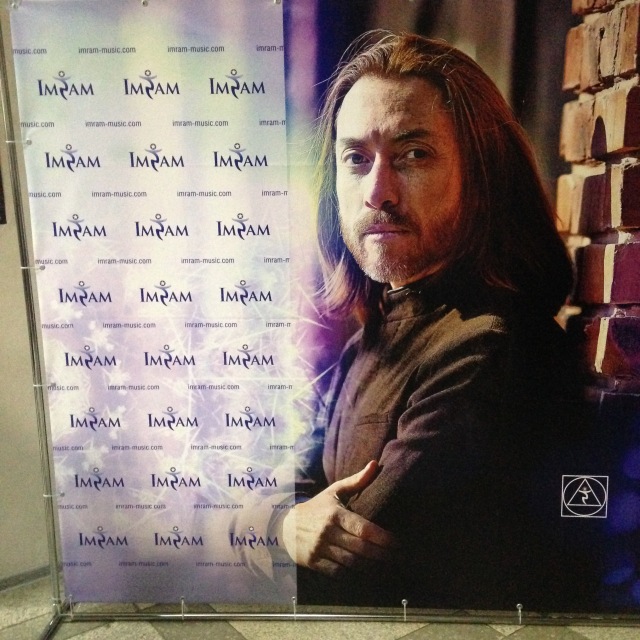
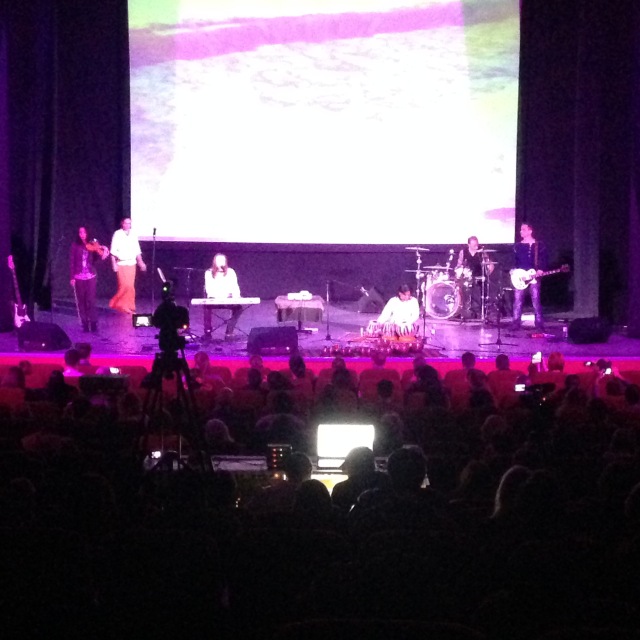
Yesterday was the 1st of December. I’m shocked at how quickly time has gone by. Going to Grozny feels like it was a life time ago, though we went in the beginning of October. I guess the phrase, “time flies when you’re having fun” would be accurate to say in this context. Fate remarked this day with go happenings. Firstly, I got to open my letter for December that Taylor sent with me. I’ve been excited to open it for the last few weeks. It was a wonderful way to start my day. Secondly, Taylor sent me some photos of the lighting of Hastings College’s Campus. It was so good to see the pretty lights wrapped around the tree and the buildings on campus. The French Memorial Chapel looks very nice. Snow is on the ground now in Nebraska and I’m excited for snow here. I’m hopeful. Thirdly, yesterday we celebrated Andzheyki Day, a holiday celebrated in Poland on the 30th of November, the Day of Saint Andrey, a national holiday there. Traditionally, this day is marked by games and to “guess on wax,” pouring melted wax through an opening in a key into water, thus forming a stiffened wax shape predicting the future. Thank you so much Martu for sharing our culture with us all. It was good to experience it again. Martu teaches Polish in our faculty and is an international student like us. She had her class help prepare the event and they ran the various stations or games. I had so much fun participating in the games and festivities two years ago and doing them again brought back very good memories. This holiday features a lot of reading from signs and fortune telling. There were several games to play to reveal one’s fortune. The first that I did was a Polish “spin the bottle.” I got the rose flower, so I’m a romantic at heart and I’ll have love in my life. The second game I did was a card reading. I picked one card in the deck. One of the students then drew three cards, all from the suit of hearts, meaning I’ll have a lot of love in my life. She then drew three more cards, telling me that I was destined to host a guest from across the sea in a short time and that I was also going to travel to a distant place. She then drew two cards, the first a queen of spades, meaning I was “ oing to go to war,” the second card was an ace of diamonds, meaning that this would be a “holy task.” Interesting… The last three cards were a 10, a 7, and a Jack. I was then told that I would “have a rest” after this task and that I would be “reunited with friends and family.” An interesting fortune to say the least.
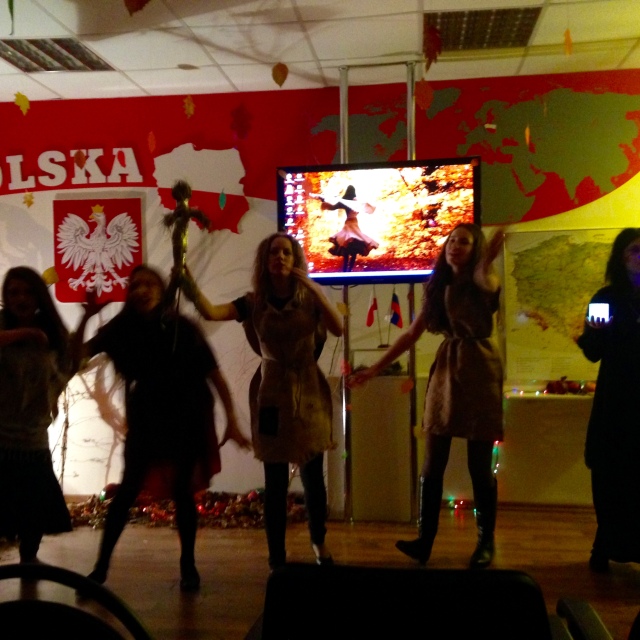
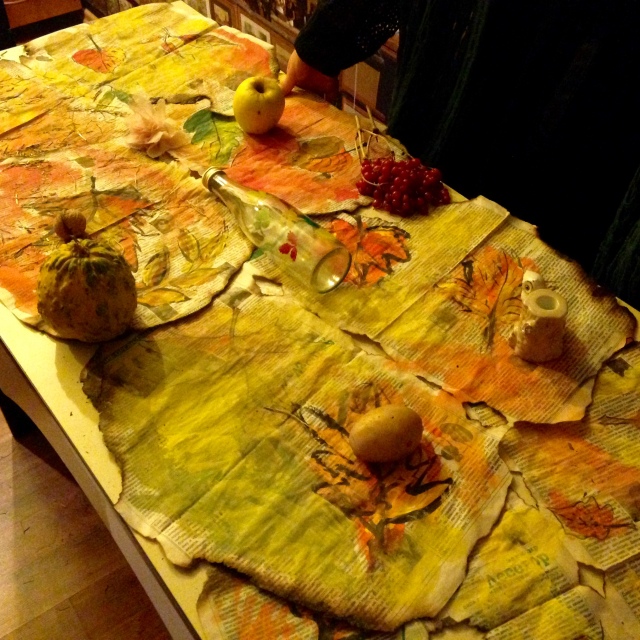
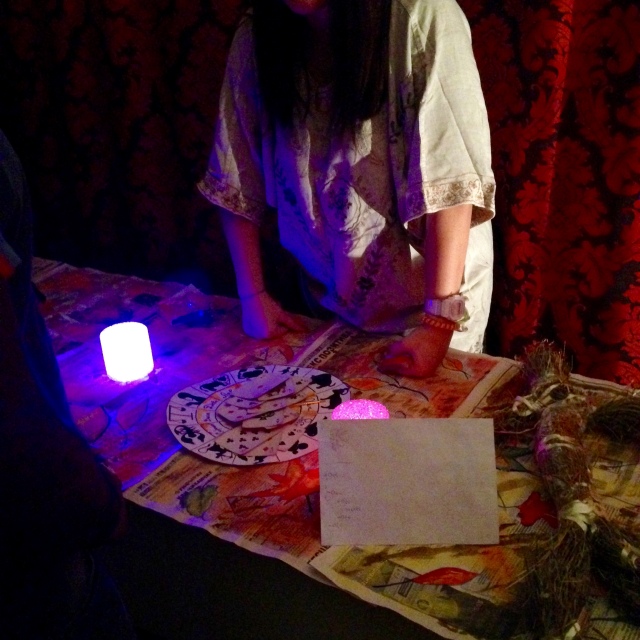
Well, that’s all for now folks. I wish you all the best. For those of you who are studying for finals in the States, best of luck to you all. I’m thankful for my families, love and support, for my friends, and for the many opportunities that I have had in life.
